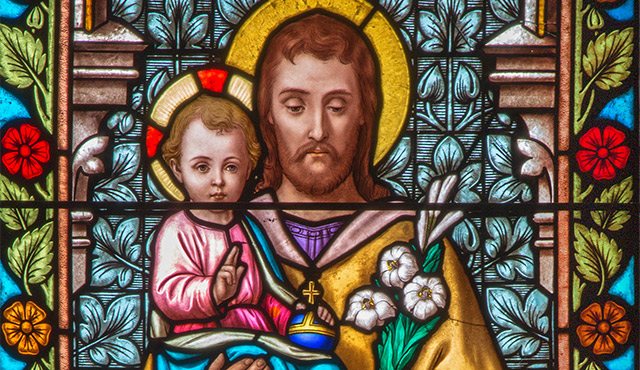There is no single recorded word uttered by him in the entire New Testament, and his role in the Scriptures is very modest, but when it comes to fatherhood, and the qualities that made a good father in the Catholic faith, Joseph’s example speaks volumes.
To mark Father’s Day, we spoke to the Rev. Msgr. Arthur A. Holquin, episcopal vicar for divine worship for the Diocese of Orange and pastor emeritus of Mission Basilica San Juan Capistrano, about what lessons fathers in the modern Catholic faith can learn from St. Joseph.
A whole lot, it turns out.
Think about it: According to the traditions and mores of the time, no Jewish man loyal to the Torah ever would approach, or have anything to do with, an unmarried girl who was pregnant.
But here was Joseph, to whom an angel said in a dream, “Take Mary for your wife,” which he did, despite her bearing the Son of God by way of the Holy Spirit.
“This should initially tell us something significant about the character of Joseph,” Holquin says.
“Joseph was not going to be victimized, if you will, by the cultural mores of the day,” Holquin says. “Instead, he was going to listen to the Word of God that came to him in a dream. And that takes a tremendous amount of trust and openness to God’s will.”
Trust and openness: two qualities that remain critical for all Catholics, not just fathers.
But since it’s June 19, we’ll focus on dads.
Joseph is most often mentioned in the Gospel of Luke, in what are collectively known as the “Infancy Narratives” (Luke 2:1-39). One of Luke’s main sources for his Gospel talked about the story of Jesus’ birth and early life.
As we all know, Joseph was a carpenter. As a father, Joseph really nailed it, Holquin says.
He always has been regarded as head of the Holy Family, but this was no traditional family. Joseph was a foster father.
“In Catholic theology, we don’t say Joseph is the father of Jesus, but he is, of course, a faithful husband to Mary,” Holquin says.
And since, according to Catholic faith, Mary remained a virgin, this means Joseph served as Mary’s (and Jesus’) protector, and that Joseph and Mary never were sexually intimate.
“Now that,” Holquin says, “takes an exceptional man.”
He added: “Joseph was a man of integrity, a man of principle, and a man who was faithful to his calling from God, which was to be a loving and protective presence for both Mary and Jesus.”
Holquin cited the story of Herod’s slaughter of the innocents, and Joseph’s response to it, which is emblematic of his quality as a fatherly protector.
What did Joseph do? He took Mary and Jesus to Egypt. The trio lived as immigrants, dealing with all the challenges immigrants have faced for centuries.
In addition to protector, Joseph was a mentor to Jesus — another role to which all fathers should aspire.
Although Jesus, according to Scripture, “grew in wisdom, age and grace before God,” implying he had some super-human gifts, his human nature had to grow and develop, too, Holquin says.
And Joseph was a mentor to him in this regard.
“Even though it’s not in the Scriptures,” Holquin says, “one can safely conclude that Jesus’ personality and his character was influenced by Mary and Joseph. How could it not be?
“And that is the greatest gift a father and mother can give to their children: the shaping of their character and the mentoring of their virtues.”
Holquin cited what he called the “beautiful story” in the Gospel of John when Jesus meets a woman at a well who had been married a number of times.
“First of all, Jesus simply talks to her,” says Holquin, something no other respectable man at the time would do. “Then he brings out her story, not to condemn her but to say, ‘You are thirsting for something in your life.’ That kind of sensitivity and dialogue Jesus picked up because that’s what happened in his own family.”
Sensitivity, compassion, being a careful listener, being non-judgmental; these and many other traits of Jesus must have been present in Joseph, Holquin says. And they are qualities present in all good fathers, he added.
Holquin says Joseph, as a father, cultivated values that stand in stark contrast to today’s less-than-civil times–a noisy, social media-driven culture that too often seems bent on driving people apart rather than bringing them together.
“A good parent is one that mentors civility and that nurtures a sense of community; a bridge builder, not a wall builder,” says Holquin.
Catholics do not celebrate St. Joseph on Father’s Day. The Feast of St. Joseph is March 19, which happens to be the day when, traditionally, the swallows return to Mission San Juan Capistrano.
But Joseph is a role model who should be emulated by all fathers every day of the year, Holquin says, even though Joseph didn’t have anything to say about fatherhood himself in the New Testament.
“One can say,” Holquin says with a smile, “that Joseph was the strong, silent type.”

